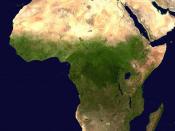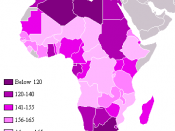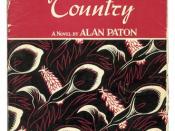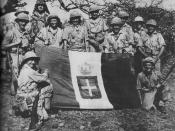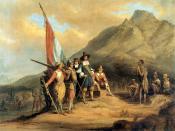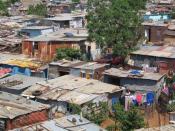If a nation is impoverished and many of its people corrupt is there an underlying cause? If a society breeds murderers and thieves motivated by their will to survive, are they to blame? These themes were portrayed throughout several of the novels studied in class. Many problems aroused soon after the colonization of Africa resulting in the need for colonizers to take some accountability for the state of Africa. The impoverished and corrupt African society described throughout the novels is portrayed through the African cultural connection to land, post-colonization, and overriding desire for money.
The novel Cry, the Beloved Country, displays the connection between land and people by portraying the colonizer's dominance of land, which results in desolate, less productive land; this same deterioration is mirrored within the African society. Stephen Kumalo describes Ndotsheni as "valleys of old men and old women, of mothers and children. The men are away, the young men and girls are away.
The soil cannot keep them any more" (Paton 34). The unappealing land results in people moving to Johannesburg, a city of violence and corruption, where most people live in poverty and lose their sense of self and morality. The line, "Cry, the beloved country, for the unborn child that is the inheritor of our fear. Let him not love the earth too deeply ... nor give too much of his hear to a mountain or a valley" forecasts the fate of South Africa using a child as a symbol of its future (Paton 111). The land is corrupt and so are the people. Just as the land will not become fertile and productive overnight, the problem of African poverty and corruption cannot be solved overnight either.
The deterioration of land and increase of corruption is a result of foreign intervention within the society, colonizing the land, and in essence, taking over their land. When discussing the result of English intervention, an African "thief" accuses white men of "seiz[ing] our national wealth and carry[ing] it back to their own countries, leaving us only a few crumbs, the price of the heritage they have taken from us" (Ngugi 166). What the English do not understand, or rather choose to ignore, is by taking African land and reaping the benefits they not only steal their property, but their lives. As a result of colonization, many Africans are forced into poverty. The white colonizers have come in and essentially taken everything from the Africans, property, land, and their lives, "Stole them from us. STOLE everything from us" (Magona 116). While a major theme throughout the novels studied in class is the corrupt society of African nations, essentially focusing on the loose morals, thievery, and poverty, these novels raise the question, who is the real thief? The English have taken everything from the African society; there is nothing left to take. Forced poverty strips away their dignity and only a few are able to retain their pride. Africans are only following the example of those who colonized them, the English stole their land and in return, the Africans must steal to survive.
At the root of the corruption is the desire for money. It is what motivated the colonizers to adventure into Africa and is one of the main factors which keep the Africans in poverty. The desire to attain money is clear and thievery is often a direct result for those with few options of acquiring money. This is made evident when Kumalo is robbed and doesn't realize this until a man points out "You have been cheated, umfundisi" (Paton 49). Kumalo is one of the few men who maintains a sense of morality but the robbery of an umfundisi, a man of god, displays the dire circumstances many of the people are forced to live in. Another robbery take place in A Cowrie of Hope with Nasula, who like Kumalo, maintains trust in others and realizes she has been robbed when "the nearby vendors confirmed [Nasula's] fears. It was clear that the man had cheated her out of her bag of beans" (Sinyangwe 84). Poverty has hit an all time low when a single mother, striving to do the best for her child by sending her to school so she can become a respectable citizen, is robbed. With the motto, "Independence is not tales about the past but the sound of money is one's pocket (Ngugi 37) what other choice do they have to survive?Paton, Alan. "Cry the Beloved Country."Ngugi. "Devil on the Cross."Sinyangwe, Ben. "A Cowrie of Hope."Magona. "Mother to Mother."
